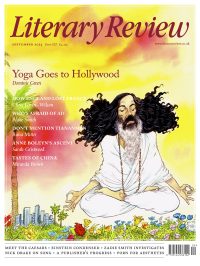Nigel Andrew
Never Lost for Words
The Dictionary People: The Unsung Heroes Who Created the Oxford English Dictionary
By Sarah Ogilvie
Chatto & Windus 355pp £22
Browsing in the basement archives of Oxford University Press one day in 2015, lexicographer Sarah Ogilvie struck gold – well, lexicographer’s gold. Outwardly, it was only a battered black book tied with a cream ribbon, but it contained the names and addresses of some three thousand volunteers who had contributed to the making of the Oxford English Dictionary (OED). Each address was written out and annotated in the immaculate cursive hand of the presiding spirit and driving force of the great dictionary, James Murray, its editor from 1879 until his death in 1915.
The OED was, like many Victorian information-gathering ventures, assembled through a form of what we would now call crowdsourcing. In an age of leisured amateurs, learned societies and energetic enthusiasts, not to mention a swift and efficient postal service, this was the natural way to do things, and Murray perfected it. From the outset, the dictionary editors had invited members of the public to contribute by reading books, noting examples of how particular words were used, writing down the words and the sentences in which they occurred on four-by-six-inch slips of paper, and sending them to the editors. Until Murray took over, this had been a rather haphazard affair, but he, with characteristic thoroughness, tightened up the process and issued a worldwide appeal for more readers to join in building what was to be a dictionary of not only British English but also world English. The massive response turned Murray’s Oxford home into a lexicographical factory, with Murray and his assistants working in the Scriptorium, a large iron shed in the garden, and members of his family also enlisted in the great enterprise.
This aspect of the making of the dictionary has been written about before, notably in James’s granddaughter K M Elisabeth Murray’s Caught in the Web of Words (1977), but the contribution of all those volunteer readers has attracted far less attention, largely because so little has been known about them

Sign Up to our newsletter
Receive free articles, highlights from the archive, news, details of prizes, and much more.@Lit_Review
Follow Literary Review on Twitter
Twitter Feed
The latest volume of T S Eliot’s letters, covering 1942–44, reveals a constant stream of correspondence. By contrast, his poetic output was negligible.
Robert Crawford ponders if Eliot the poet was beginning to be left behind.
Robert Crawford - Advice to Poets
Robert Crawford: Advice to Poets - The Letters of T S Eliot, Volume 10: 1942–1944 by Valerie Eliot & John Haffenden (edd)
literaryreview.co.uk
What a treat to see CLODIA @Lit_Review this holiday!
"[Boin] has succeeded in embedding Clodia in a much less hostile environment than the one in which she found herself in Ciceronian Rome. She emerges as intelligent, lively, decisive and strong-willed.”
Daisy Dunn - O, Lesbia!
Daisy Dunn: O, Lesbia! - Clodia of Rome: Champion of the Republic by Douglas Boin
literaryreview.co.uk
‘A fascinating mixture of travelogue, micro-history and personal reflection.’
Read the review of @Civil_War_Spain’s Travels Through the Spanish Civil War in @Lit_Review👇
John Foot - Grave Matters
John Foot: Grave Matters - Travels Through the Spanish Civil War by Nick Lloyd; El Generalísimo: Franco – Power...
literaryreview.co.uk